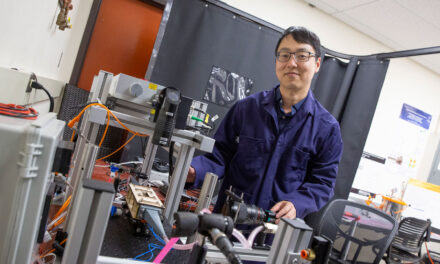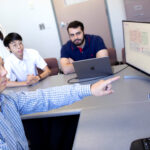
VOCTEC, IUCN deliver micro-hydro energy workshop in Fiji
A three-day workshop on micro-hydro energy systems for policymakers was held Sept. 24-26 in Nadi, Fiji. It was presented by the Vocational Training and Education for Clean Energy (VOCTEC) program funded by the U.S. Agency for International Development, and led by Arizona State University, in cooperation with International Union for Conservation of Nature, Oceania.
Twenty high-level officials and policymakers, including observers who represented Pacific-based donors and local nongovernmental organizations, attended. Participants included senior government and industry officials from the Federated States of Micronesia, Fiji, Papua New Guinea, Samoa, Solomon Islands, and Vanuatu, as well as representatives from Pacific-based regional entities, including from the Secretariat of the Pacific Community, the European Union, and The University of the South Pacific.
The workshop introduced the VOCTEC program and micro-hydro energy systems and discussed the current state of the micro-hydro energy market in the world, hydro-power resource assessment and siting tools and procedures, turbine technology, hydro-power economics and policies, and environmental considerations for siting micro-hydro energy projects, specifically as they relate to the Pacific region.
Electrical power from micro-hydro plants can supplement the efforts of many Pacific Island nations to obtain a good mix of renewable energy types that can provide an around-the-clock energy supply. Micro-hydro plants, typically ranging from 10-100 kilowatts, can be ideal for providing a continuous flow of energy to remote rural areas in the Pacific, reducing the emission of greenhouse gases and the dependency on imported fossil fuels. Micro-hydro plants can generate power at a relatively low cost per unit and have minimal adverse environmental and social impacts.
In opening the training workshop, Anare Matakiviti, energy coordinator for the International Union for Conservation of Nature’s Oceania Regional Office, emphasized the importance of building the capacity of Pacific Island countries in the areas of renewable energy, including micro-hydro. He discussed the training builds on the VOCTEC-IUCN sponsored wind-energy training earlier in the year.
Ambika P. Adhikari, VOCTEC program manager at ASU, discussed VOCTEC’s ongoing efforts to help 10 Pacific Island nations enhance their human capacity in the renewable energy sector. Adhikari, a co-instructor for the training, presented modules on environmental, socio-economic and policy issues.
Michel Maupoux, technical director of Green Empowerment, a VOCTEC partner, presented modules on the technical, financial and siting issues involved in assessing the viability and introduction of micro-hydro energy technology to the Pacific Island countries. Subjects included market trends, methods and tools for assessing hydro-power resources, determining the viability of hydro-power energy production and engineering and maintenance technologies. He also gave hands-on instruction on hydro-power components at a local micro-hydro plant.
Presenters noted that micro-hydro energy potential has not been fully realized in the Pacific region, and suggested that decision makers could explore opportunities for adding micro-hydro plants to their energy mix. In doing so, the policymakers can promote public financing and funding policies.
Proper government subsidies, tax incentives, donor grants penalties and rebates also are factors in encouraging the implementation of hydro-power technology. However, the land ownership situation in the Pacific is often complex with indigenous groups owning land collectively, and the public officials and promoters must work closely with the local communities to ensure that a proposed project can succeed and that it benefits local communities.
“Micro-hydro energy systems can be an important part of the menu of renewable energy system in some countries of the Pacific region,” said Anshuman Razdan, director of ASU’s Advanced Technology Innovation Center and the administrative principal investigator of VOTCEC. “Through the USAID-funded VOCTEC program, ASU is pleased to have provided this important workshop in cooperation with IUCN Oceania.”
The workshop concluded with a field visit and presentation of certificates to the participants.
Media Contact
Judith Nichols, [email protected]
480-965-9248
Ira A. Fulton Schools of Engineering



































